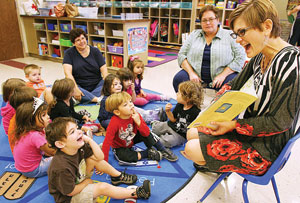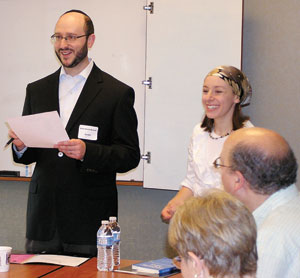 Rabbis in Kansas City are proud of the fact that across the board they get along well. Many will tell you it’s highly unusual for rabbis of very different spiritual beliefs — from Chabad to Reform to Orthodox — to support each other in one organization such as the Rabbinical Association of Greater Kansas City. The local rabbis want to take that support for each other a step further and begin finding ways for their congregations to collaborate more in an effort to build a more vibrant Jewish community for the future.
Rabbis in Kansas City are proud of the fact that across the board they get along well. Many will tell you it’s highly unusual for rabbis of very different spiritual beliefs — from Chabad to Reform to Orthodox — to support each other in one organization such as the Rabbinical Association of Greater Kansas City. The local rabbis want to take that support for each other a step further and begin finding ways for their congregations to collaborate more in an effort to build a more vibrant Jewish community for the future.
The concept of collaboration is not new said Rabbinical Association President Rabbi Herbert Mandl of Kehilath Israel Synagogue.
“The whole concept of collaboration between synagogues began at the Rabbinical Association of Greater Kansas City. It is my hope that many synagogues will have joint ventures between them in the year ahead,” he said.
Over the years the Rabbinical Association has planned communitywide events to help bring the community together, most notably the upcoming Selichot service which will be held at Congregation Beth Torah Saturday night, Sept. 24, the all-night Shavuot program and the Day of Discovery which kicks off the education season.
The idea of collaboration is becoming more important, according to several local rabbis, because of the changing Jewish community.
“Nobody knows how many Jews there are in this city, but we know that the current situation is very different than it has been in the past,” said Beth Torah Rabbi Mark Levin. “There isn’t a religious school in the city that has as many kids in it as it once did and we think there are fewer Jewish kids overall.”
Todd Stettner, Federation executive vice president and CEO, echoed Rabbi Levin’s comments that the community is smaller than it is in the past. Because fewer people are joining congregations and affiliating with Jewish agencies and organizations, there is also less money to go around. He said the Federation agencies have been working together for a while to find ways to cut expenses and collaborate as a way to continue to offer high-quality programs and services to the community.
Rabbi Levin said most experts don’t believe the Jewish future will look like the Jewish past. Because of that, the Jewish community will have to have a new vision to make the Jewish community “the most creative and vibrant Jewish community it can be.”
As The Temple, Congregation B’nai Jehudah’s Rabbi Arthur Nemitoff sees it, congregations here can no longer afford to be isolated silos “who are only looking out after what makes us the best and what makes everybody else be less.”
“We have to change that way of thinking into one of how can we make this community the strongest, most vibrant Jewish community that Kansas City has ever seen,” he continued. “We need to get rid of our institutional egos and we have to begin work together that will ensure not just the survival of the Kansas City Jewish community, but help it thrive.”
Rabbi Alan Cohen, who is serving as interim rabbi at Congregation Beth Shalom, believes that community is strengthened by groups working together, as opposed to working at opposite ends or at overlapping or competing purposes.
“Additionally the state of the economy means we can use our resources better, not just monetary resources but human resources as well if we work collaboratively,” Rabbi Cohen said.
Working together, Rabbi Cohen believes, is a great way to strengthen the community.
“We will strengthen each other if we have one program with 15 people attending rather than three programs that attract five people each,” Rabbi Cohen said.
As we move toward more collaboration, Rabbi Cohen said we will have to overcome the issue that members of one congregation are often reluctant to attend programs at other congregations. He hopes that the rabbis will begin promoting as many Jewish programs in the city as possible.
“In a way it’s saying not only do we approve of their programs, but we are encouraging our members to attend them,” Rabbi Cohen said.
Moving ahead There are several collaborative ventures already taking place. For example, beginning this fall Beth Shalom and Beth Torah entered into an agreement that allows Beth Torah families to enroll their children at Beth Shalom’s preschool at a reduced rate. As part of the agreement, Beth Torah’s Rabbi Vered Harris now has an official presence at the preschool.
There are several collaborative ventures already taking place. For example, beginning this fall Beth Shalom and Beth Torah entered into an agreement that allows Beth Torah families to enroll their children at Beth Shalom’s preschool at a reduced rate. As part of the agreement, Beth Torah’s Rabbi Vered Harris now has an official presence at the preschool.
In August the city’s newest Reform congregation, Temple Israel, began renting space from the Conservative Congregation Ohev Sholom. The two rabbis, Scott White and Jacques Cukierkorn, have both publicly stated they expect to plan activities together.
“When you measure Jewish demographic trends against the amount of bricks and mortar and staff that has to be maintained in this town, growing collaboration between congregations is the wave of the future. It’s already well under way in terms of holding combined programs, and I’m excited that my congregation is facilitating another stage,” Rabbi White said.
While many rabbis point out that combined worship between congregations of different movements is unlikely, the two largest Reform congregations — B’nai Jehudah (1,050 families) and Beth Torah (650 families) — plan to worship together on Sept. 30.
Adult education appears to be one of the first avenues where collaboration will be heavily explored because, as Rabbi Cohen explained, “we all have a fundamental commitment to Jewish learning.”
“The Day of Discovery is a beautiful example. We’ve been successfully working together on adult Jewish education for many, many years,” he said. “It is something that would be very beneficial to the community where we can take advantage of the demographics and the shrinking economic resources.”
“I think there’s no doubt that we will have combined study for all the institutions in the city and in all likelihood led by the Jewish Community Center,” noted Rabbi Levin. “I don’t think that’s going to be too hard to achieve and I would hope that the city would provide some sort of funding for it so we can make that happen.”
Indeed the first step toward that has been taken by the Jewish Community Center and the Federation this summer when they produced a brochure, “Jewish Life & Learning for the Curious Mind,” which they call “Your KC Guide to Jewish Events and Classes.” It was done because staff members from both organizations agreed “that we could accomplish more by working together than we do alone.”
Stettner said that the JCC and Federation, through its educational arm CAJE, will continue to collaborate on more than just brochures in hopes of expanding the educational offerings in Kansas City.
Rabbi Levin said successful collaborative efforts will take time and won’t happen overnight.
“When it does happen there will be much greater variety and great expertise at less citywide expense,” Rabbi Levin said. “How we get that done is another question, but I think that’s something that we can all look forward to.”


